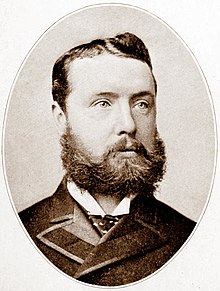Hugh J. Grant
| Hugh J. Grant | |
|---|---|
 |
|
| Born |
September 10, 1858 New York, New York , United States |
| Died | November 4, 1910 (aged 52) New York, New York |
| Cause of death | heart attack |
| Resting place | Calvary Cemetery |
| Nationality | American |
| Title | Mayor of New York (1889-1891) |
| Political party | Democratic |
| Spouse(s) | Julia M. neé Murphy |
Hugh John Grant (September 10, 1858 – November 3, 1910) served as the 88th mayor of New York City for two terms from 1889 to 1892. He remains the youngest mayor in the city's history. He is also one of the youngest mayors of a major United States city and one of the earliest Roman Catholic mayors of New York City.
Hugh Grant, whose father John Grant had grown rich in politics and real estate, was born on West 27th Street in New York City, on September 10, 1858. He was orphaned young and raised by his guardian, a man named McAleer. He attended both public and private schools, spent two years at Manhattan College, another year studying in Germany, and two more at Columbia Law School. Though the earliest data, including the United States census of 1860 and 1870 and Grant's 1878 passport application, establish his birth year as 1858, early in his political career he began to present himself as born several years earlier in 1852 or 1853, perhaps to avoid calling attention to his youth. A Tammany Hall Democrat, he began his political career as a city alderman from 1883–1884, where he was one of only two alderman not caught up in a financial scandal related to the Broadway Surface Railroad. For the remainder of his public career, however, he was a compliant member of Tammany under the patronage and control of its leader Richard Croker.
Grant lost the race for mayor as Tammany's candidate in 1885, but won the office of sheriff in 1886. He was Sheriff of New York County from 1887 to 1888. He was Mayor of New York City from 1889 to 1892, appointing Croker as New York City Chamberlain in 1889. His administrative accomplishments included the reorganization of city administration and the initial stages of placing the city's electrical system underground. He declined to run again at the end of his second term, but ran once more in 1894 and lost.
The details of Croker's and Tammany's bribes and involvement in criminal activity came to light through the work of the Fassett Investigation of 1890. Grant's role included $25,000 in cash given to Croker's daughter Flossie—supposedly gifts he made as god-father to the little girl. A grand jury described Grant's tenure as Sheriff as "tainted and corrupt". In February 1892, crusading reformist Rev. Charles Parkhurst of the Madison Square Presbyterian Church denounced his administration: "every step that we take looking to the moral betterment of this city has to be taken directly into the teeth of the damnable pack of administrative blood-hounds that are fattening themselves on the ethical flesh and blood of our citizenship." He called Grant and his political colleagues "a lying, perjured, rum-soaked, and libidinous lot" of "polluted harpies."
...
Wikipedia
